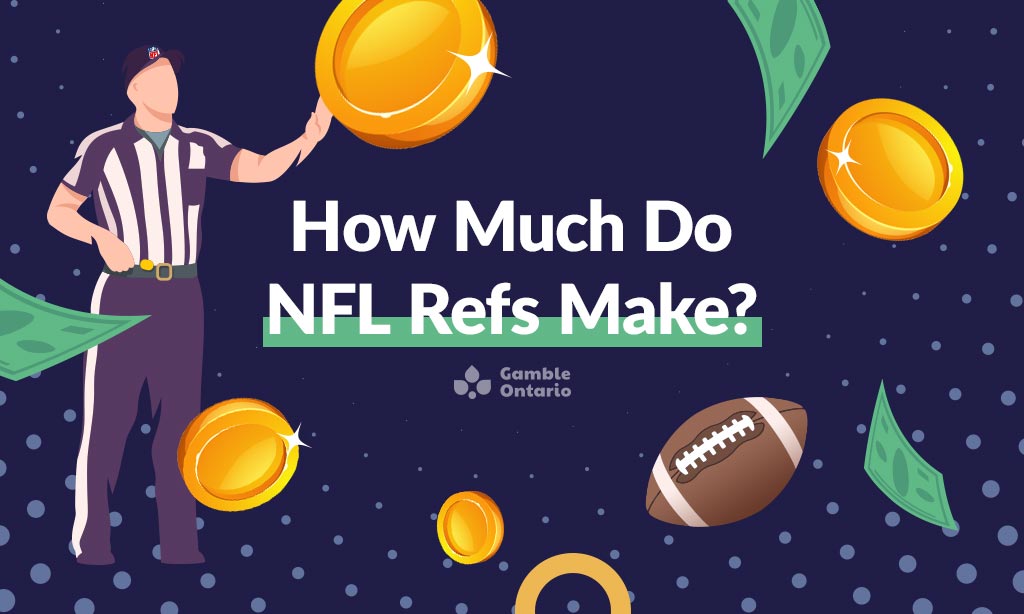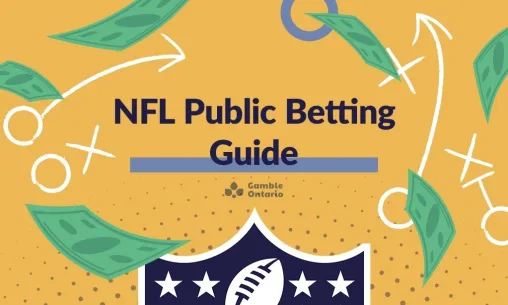How Much Do NFL Refs Make?
NFL referees tend to take more flack than anything else. It is one of the toughest jobs in sports, and it definitely doesn’t come with much fanfare or appreciation.
Which begs the question, “How much do NFL refs make?”, there has to be a reason why the zebras endure criticism on the regular, aside from a love for the game.
Whether you’re browsing NFL betting sites or just curious about the game’s inner workings, read on to find out how much NFL referees are bringing home, as well as the ins and outs of what it takes to get into this line of work.

NFL Referee Salaries: From Uncertainty to Six-Figure Earnings
How much do NFL refs make? The answer to that question has fluctuated quite a bit throughout the years. Until the early part of the 2000s, professional referees and officials – not just in the NFL but in other professional leagues – could not count on the income to pay the bills.
As the league continued to grow to epic heights beginning in 2000, referees began earning more serious wages.
In 2025, NFL referees continue to earn solid salaries that reflect the high-pressure and critical nature of their jobs.
The average annual salary for an NFL ref is approximately $205,000, which equates to around $11,400 per game, a figure based on a collective bargaining agreement from 2019.
While this number is impressive, it’s worth noting that officials can make even more depending on the specific games they work, particularly in the postseason.
- For example, referees who officiate postseason games can earn an additional $1,500 to $5,000 per game as a bonus.
- For the Super Bowl, the bonus can climb even higher up to a whopping $50,000.
The pay scale can vary significantly based on a referee’s experience, position within the officiating crew, and the importance of the games they are assigned to.
For example, head referees generally make more than other officials on the field, with some estimates suggesting that they earn higher figures, though exact numbers are not publicly disclosed.
A referee working the Super Bowl or conference championships can also see a significant boost in pay, reflecting the importance of the job.
Several factors impact how much an NFL ref will get paid. Experience plays a significant role—refs who have officiated many seasons typically receive higher pay than entry-level referees, particularly those who have built reputations for accuracy and consistency over the years.
Their role on the officiating team also matters, as head referees often earn more than other officials like line judges or back judges.
Working high-stakes games, especially in the playoffs or the Super Bowl where a few seconds can make all the difference, adds to their earnings.
Over the years, the salary structure for NFL officials has evolved. In 2012, referees went through a notable lockout, which resulted in a new collective bargaining agreement that increased their pay. More recently, the agreement from 2019 continues to guide referee salaries, though the league keeps official details somewhat under wraps.
In a profession that’s constantly under intense scrutiny for controversial calls, NFL referees are compensated well for their crucial role in the game, reflecting their responsibility to keep the game fair and flowing smoothly under high pressure.
Is Being an NFL Ref a Full-Time Job?
For a long time, the answer was a resounding “no.” In the early days of the NFL-AFL merger, referees and players alike were hardly making enough to pay the bills. It would be commonplace to see both sides working at least a part-time job during the year in order to supplement income.
It took a lot longer for NFL officials to reach full-time status. Players in the 1980s and beyond began earning enough salary to justify not working a “normal” job. This is somewhat made up for by the fact that most athletes today work out and train year-round, essentially earning their checks in a different manner.
The influx of money into the league through sponsorships and TV deals has changed this situation drastically. Nowadays, NFL referees can expect to make a very solid living as they make around 4x the average American salary.
Now, being a referee is a full-time gig. That is part of the justification for a cushy six-figure job (having to get calls right and deal with the merciless public is another reason). There is a lot more to the position than meets the eye, and we will cover more of that in a few sections below.
How Much Do NFL Refs Make to Work the Super Bowl?
The question of how much NFL refs make isn’t a simple one. There is the amount that they make for the regular season – roughly $205,000 to $250,000, if not slightly more – and then there are the bonuses that officiating crews receive for working playoff games and the Super Bowl.
The NFL playoffs are a critical time of the year. The league brings in the most experienced officiating crews, the ones that score highest according to NFL standards. There are usually only a few crews that work the various playoff games, leading to one crew working more than a few over the course of an NFL playoff season.
The rate of a playoff bonus is a bit hard to nail down. Some estimates have seen referees earn $1,500 per playoff game on top of their annual flat-rate salary. On the high end, the more experienced officials can earn around $5,000 per playoff game. For the best of the best, that can equate to $260,000 to $270,000 before we even get to the biggest game of the year: the Super Bowl.
Officials who are asked to regulate the NFL’s championship game make big-time money. It is estimated that, on top of regular season salaries and postseason bonuses, referees can earn between $40,000 and $50,000 for being asked to officiate The Big Game.
For the best-graded and most experienced of the NFL officiating crew, it is not uncommon to bring home between $300,000 and $330,000 by the end of the season. For a profession that once was steeply underpaid, it has become a great way to earn money.

NFL Referee Salaries Throughout the Years
The league didn’t disclose any information on what its officials make, likely because they receive enough harassment and derision from emotional fans as it is.
Just like the game itself, the role of officials has evolved throughout the years. So has the paycheck that comes along with it.
The Early Days
No one knows for sure what NFL refs were making back before and immediately after the merger. It is most likely that they received peanuts for their efforts, making far more from full-time jobs than by being a professional referee. This was during a time when players also had to work jobs because being a professional athlete did not pay well.
The 1980s and 1990s
As league revenues began to rise to substantial levels in the 1980s and 1990s, the league began to understand the need for full-time professional officials. The pay didn’t quite match the expectations that the league set forth.
Granted, referees were now making a few thousand dollars over the course of a season, far improved from the early days. But it is a far cry from what they make now, with most needing at least part-time jobs to help stabilize their income over the course of a year.
The New Millennium
With the league becoming a billion-dollar industry at the turn of the millennium, referees and officials began getting a piece of the pie. Referees began making six figures over the course of an NFL season, with incentives included for officiating playoff games and Super Bowls.
Professional officiating was being seen in a more serious light. To train and develop more accurate officials, leagues needed to invest time and money into those individuals. For the first time ever, referees could earn a comfortable full-time wage despite only “working” from September to February.
What Do NFL Refs Do in the Offseason?
At one point, being an NFL ref was considered to be a part-time job. Like the development of players training year-round, officials do much the same. That said, unlike a full-time job, the referees do not get benefits but do receive a 401K plan.
When the offseason comes around, referees don’t just wait around for the season to start. The majority of them attend training camps and minicamps. The goal here is to practice officiating for the coming season, essentially honing their ability in much the same way that the players do.
With greater repetition and experience comes a keener eye for the game. The more experienced officials gain something of an advantage by continuing to sharpen their skills in advance of every NFL season.
How Can You Become an NFL Referee?
To some, being an NFL referee looks like a pretty sweet gig. After all, you get paid – in the six figures, as it turns out – to be right on the field in the middle of the action, watching everything unfold as closely as possible. But the gig definitely comes with its stressors.
Unlike the fans in the stands or those watching at home, an NFL referee must remain neutral and unbiased at any time. If any bias is uncovered, it can compromise the integrity of the game. More importantly, it puts the official at risk of being removed from their position and affiliation with the NFL Referees Association.
Maybe after hearing all of that, you are ready to give it a try. How do you make it into the professional referee ranks? The road is quite long, and just a few lucky professionals manage to ply their trade in the biggest football league in the world.
1. An Education is Necessary
The most common misconception about NFL officials is that they can just walk in off the street with no background. For most NFL officials, a college degree is a major advantage. Any of the sports-centric degrees will make it more likely to get a look from the league than those who possess no such degree.
Having an educational background in sports may not be a necessity, but it can give an aspiring referee a leg up on the competition. Having a sports-related degree shows a deeper knowledge, understanding, and appreciation of sports.
2. Training is a Must as Well
Even if you have just obtained your bachelor’s degree, you can’t advance to the big stage without having some sort of training. There are colleges, third-party training schools, and officiating organizations out there that offer training programs.
Enrolling in one or more of these programs can be the best way to earn a deeper understanding of the role and responsibilities of an official. It can also give trainees a chance to better acclimate to the officiating landscape, something that changes with each passing level.
3. State Registration
NFL Referees must begin the official path to the NFL with high school-level games. Becoming officially registered to referee high school football games has become an unofficial mandatory track for reaching the NFL.
Registration requirements and standards can vary from state to state. Each has its own high school sports regulatory body, the entity that hands out registration to qualifying officials. Seeking out these organizations and knowing what their requirements are is a great place to start.
4. Experience, Experience, Experience
While each of the prior steps is a necessary part of the process, prior experience cannot be replicated. Getting properly educated, trained, and registered is the first step in the process. With those assets in hand, officiating high school football should be the next step on the totem pole.
Officials typically begin by cutting their teeth in the high school ranks. The ones that perform better can quickly move up to college football leagues, even refereeing for specific colleges. The path to higher levels of college may begin with lower levels like D-III and the sublevels that lead into NCAA Division I.
The more games a referee can get under their belt, the better. The most ambitious referees find a way to get in on any game possible, growing their experience and expediting the track forward into the professional ranks.
5. Get Certified
One of the final steps in the process is to get certification. Spending time at special camps and training sessions is always a good thing, even if the NFL doesn’t specifically require it. Any extra credentials or certifications may earn a longer look from the NFL compared to other candidates.
Officials will need to work at least five years of college games in order to meet basic NFL standards. Like teams, the league sends scouts to certain games in order to seek out talent to bolster the future ranks of NFL officials.
Being an NFL ref isn’t easy. They’re under a lot of pressure to make quick, game-changing decisions. But the pay is getting better. Nowadays, an average ref makes about $205,000 a year. The top refs? They can make over $250,000. And that’s not all. Playoff and Super Bowl games come with extra cash, sometimes pushing yearly earnings above $300,000. So, while it’s a tough, full-time job, it does come with a pretty nice paycheck and a front-row seat to all the action.
FAQs About NFL Referee Salaries
Who is the highest paid NFL referee?
Walt Anderson (now retired), Brad Allen, and Craig Wrolstad are among the NFL referees who have reportedly reached a peak salary of $250,000 at some stage in their careers.
How much do NFL refs make per game?
In postseason contests, referees can expect to earn double what they make during regular-season games. Other reports show that NFL refs make an estimated $11,400 per regular-season match.
How much do Super Bowl refs get paid?
Super Bowl referees in the U.S. can earn anywhere from $25,486 to $668,979. The average salary is around $122,079. Most referees—about 57% of them—make between $122,083 and $304,034. The highest earners can make up to $668,979.
What do NFL refs make?
The annual earnings for NFL referees can reach heights of $430,000. This peak salary is generally available to officials with at least a decade and a half of experience. Those just breaking into the field can anticipate a base salary of around $200,000. Referees also benefit from yearly pay bumps and are usually tasked with officiating a maximum of 73 matches each season.
How hard is it to become an NFL referee?
To be eligible for a role as an NFL referee, one must have a minimum of a decade’s experience in football officiating. Within that decade, at least half of the time should involve overseeing significant college matches. Prior to reaching this level, extensive training is a prerequisite.
Read More About NFL: Guides, Betting Tips, and Season Stats
Rowan is a highly accomplished sports betting journalist with a proven track record of over 6 years in the sports media industry. He is widely recognized for his insightful coverage and thought-provoking commentary on major leagues like the NBA, NFL, and NCAA.

Facts checked by Eamon Doggett




















